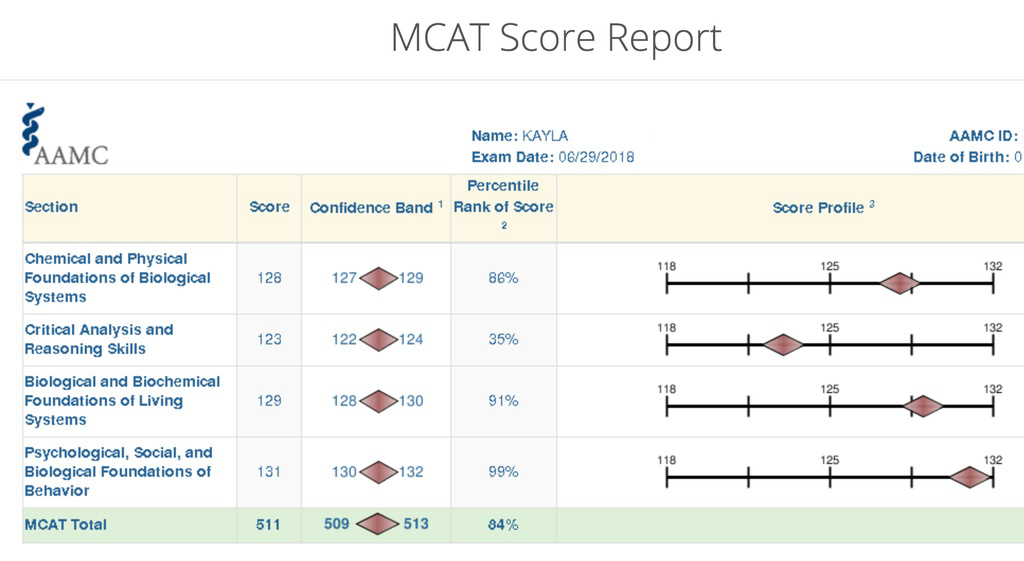This top scorer MCAT case study is jam packed with a lot of valuable information, so we highly suggest you read it all the way through to the end.
You'll very likely pick up on one or two golden nuggets of information that will help you in your MCAT prep.
With that said, in this article we'd like to introduce you to Kayla S., a 511 scorer...
More...
With a 131 in Psychology/Sociology, we made sure we found out how Kayla studied for that section, which we'll reveal later in this article.
Additionally Kayla plans to retake the MCAT, which we'll also talk more about later in this article. So lots of good stuff coming up but first...
We asked Kayla to give us some insight into her MCAT journey, including how she prepped and what her schedule was like...

"Immediately after school ended for the summer I really dove into my MCAT studying.
I made a schedule to work around my other obligations and stuck to it. I was lucky enough to have a scribe job and volunteer research position that allowed me to take ~2.5 weeks completely off prior to my test.
I studied greatly for about 2 weeks with some work and research on the side, but dedicated those last 2.5 weeks before my test to complete and utter MCAT studying.
I struggled to focus during my 12 hour study days, but would set myself a timer for ~1-1.5 hours and make myself focus solely on that for the allotted time before I took a break or ate a snack."
It's common to see 510+ scorers create and stick to an MCAT study schedule that works for them, dedicating the last 2-4 weeks to strictly MCAT studying, and managing energy through the use of breaks...
Looks like she did everything the "top scorer way" here, which isn't surprising since she did download and go through the Top Scorer MCAT Strategy Guide...
Besides those insights, we asked Kayla what other strategies in the guide she found valuable in helping her achieve the MCAT score that she got...
"I came across the MCAT strategy guide and was SO happy that I did. It hit on all the questions I had and all the strategies that I needed to implement in my studying.
Most of all, it made me really focus on the PROCESS - studying for the MCAT is not about memorizing techniques, methods, terminology. It is about connecting ideas and being able to apply them.
I spent a lot of my spring college semester taking notes on my MCAT prep books, but those only touch on the specifics and from all my studying, I really started to realize that someone could truly take the test with only basic science information and still do well as long as you know how to comprehend, analyze, make predictions, and interpret scientific readings.This is exactly what the strategy guide helped emphasize, which was something that I had never quite grasped, since all other prep companies sell you on needing to memorizing all the specifics.
Something I also found EXTREMELY helpful were the "mental health" tips. Having been a competitive athlete, I can honestly say that the MCAT is utterly and truly a marathon.
Just with athletics, your mind is everything. I started meditating for ~10 mins each morning before going off to my studies, and although I never really noticed pronounced changes in my scores, I did notice an overall improvement in my focus and general being content. Meditating helped me see the silver linings in each day of studies."
Very well articulated. The key is to remember:
Next, what was Kayla's approach for getting a 131 on P/S? Here's how she said she did it...
"Out of all the sections, I usually go the absolute slowest for P/S, despite it being somewhat of an easier section for me. I noticed that when I went quickly through, telling myself I could recheck weird questions later, I always made more smaller mistakes that I wouldn't think to check back on. Then I began to treat each question as if it was the last time I would be seeing it - take my time, make my best judgement, and move on.
Of course, if there is a question that is wordy, confusing, or vague, I mark it and go back in hopes that taking a break from it and coming back will allow me to see something that I missed before.
So it's really a balance - going slow and making each answer "final", but also knowing when a question could use a second look later on from a fresh perspective.
In my opinion, I also feel like P/S section is not trying to trick you like many of the other sections seem to, so I try not to overthink them. Usually the answers end up being the simplest (Law of Pragmanz?!) And of course, pure memorization of terms helps haha. Looking up any terms I would come across and noting them either in Anki cards, quizlet, etc."
Great points here. We'd just like to take this moment to remind you that there's no harm in trying a top scorer's strategy. Chances are it's going to work and help improve your score but if it doesn't after several attempts, don't force yourself to stick to it.
Everyone is different and at the end of the day, one of the best MCAT strategies is to know yourself.
Lastly, as we mentioned earlier, Kayla is retaking the MCAT. As you may have guessed, it's due to her CARS score. So we asked her to share her CARS experience, her biggest challenge, and how she plans on improving her score...
"In all honesty, I'm not exactly sure what happened there. My lowest CARS score on any AAMC practice test was a 126 and my highest a 128, so my 123 was substantially lower than I would have ever expected. That being said, out of all the sections, CARS was probably the most different on my real test than any of the practices - much longer, but truthfully I didn't think the passages were very difficult.
I guess I was expecting vague philosophy or convoluted literature passages, but what I saw instead were just really long, casual passages (narratives really) with more convoluted questions. Because of that, I'm thinking I may have gotten so caught up in understanding the passage (despite it not being as difficult as expected), and then not leaving myself enough time for the questions.
I messed my timing up for sure - ended up having to guess on most of last passage, which had never happened to me before, though I didn't think that would hurt me as much as it did."
If someone is getting decent scores on AAMC practice tests and on the real they got a much lower score than normal, it’s usually a sign of either unexpectedly weird or hard questions on test day, which happens rarely OR it’s a sign of nerves getting in the way on test day, and screwing up timing by causing them to read/analyze/overthink more than they should, etc.
From the sounds of it, it seems like Kayla may have just gotten an ‘off’ CARS section that day - probably still manageable enough for her to do well on it, but because it wasn’t something she was used to or expected, it might have thrown her off, triggering some worry so she spent more time reading than she needed to, and her overall timing suffered as a result, which lowered her score even further.
Here are some of the improvements Kayla has in mind that she'd like to make...
"I did not focus so much on identifying question/answer types or the difficulty of the passages, so that would be something I would like to give more attention to this next time around. I also want to get in the habit of being more comfortable reading through convoluted, vague, boring passages even more so than I was before. Also, biggest improvement that will need to be made is my timing."
We cover the 130+ CARS scorer methodology for each one of those areas, in the CARS Mastery Course.
If you're struggling with CARS or any section of the MCAT, we highly recommend you don't wait until you get your scores back to realize what steps you should have taken and what areas you should have improved on...
Having to retake the MCAT is a huge, painful burden on your time, your application, your money, your emotions, your self-esteem, your mental strength... even your relationships.
Study in the smartest way possible now, so you don't have any regrets later, by copying the same systems many 515+ scorers have used when they studied for the MCAT...
So you can make sure, this is the last time you write the MCAT.
Even if you think you're studying properly and your MCAT prep can't get any better, it doesn't hurt to be absolutely sure.
At the very least, you'll watch the lessons and see that 515+ scorers are studying exactly how you're currently studying, and that will give you a big boost in your confidence and self esteem...
Where instead of thinking you're going to do well on the MCAT, you'll know...
You got this,
The MedLife Mastery Team
Your "MCAT Success" Mentors
Additional Reading -- MCAT Success Stories:
- How Jennifer Increased Her MCAT Score By 10 Points In Less Than 30 Days
- A 17-Point MCAT Score Increase: 496 to 513! (ft. Stephanie Hayes)
- From 490 To 511 On The MCAT: His 21 Point Score Increase
- Siraj’s 3-Month 523 MCAT Study Plan As A Full-Time Student
- From 485-495 Plateau + 4 MCAT Attempts To 514 (1.5 Years Later!)
- 41-Year-Old Accountant and Father Dominates The MCAT With a 520!
- Noah’s MCAT Success Story: From 496 To 510 On The MCAT In Less Than 30 Days!
- 19 Point MCAT Score Increase In 6 Weeks While Working Full Time
- From 500 Plateau to 516 in Less than 30 Days (ft. Abbi Shrontz)
- How I Went From 500 To 513 on the MCAT In 4 Weeks
- From 501 Plateau To 513 On The MCAT
- From 499 to 512 on the MCAT in 24 Days
- Melissa’s MCAT Scores Kept Going Down, But She Didn’t Give Up
- How Tanmay Scored 514 On The MCAT In Just 3 Months!
- How Peter Went From 499 To 513 On The MCAT In 8 Weeks
- From 494 (2015) to 502 (2019) to 513 on the MCAT (ft. Jennifer Nagel)
- From 498 To 514 WITH A Busy Schedule!
- From 499 To 511 In 4 Weeks On MCAT Retake!
- From 500 To 512 (Exact Goal Score) In 30 Days!
- From 500 To 514 On The MCAT (2.5 Years Later)
- From 501 To 514 In The LAST 2 WEEKS Before The MCAT!
- From 64th Percentile To 98th Percentile On The MCAT In Less Than 30 Days
- How He Increased His MCAT Score From 499 To 512 In 3 Weeks
- From 489 To 509: How She Improved Her MCAT Score By 20 Points
- 6 Point Score Increase In the Last Week Before the MCAT
- How Melanie Increased Her MCAT Score By 12 Points (From 505 to 517)
- Interview with a 519 Scorer, Re-Taker, and MS1: Julia Meguro
- MCAT Master Interview With A 100th Percentile Scorer: Priya Swaminathan
- Best MCAT Bio/Biochem Strategies – Top Tips From A 131 Scorer
- From 499 To 515 On The MCAT In 7 Weeks!
- Hope’s MCAT Retake Story: I Went From 500 to 514 In 6 Weeks!
- How Oleksandra Retook The MCAT and Scored 510
- How Suman Scored Over 510 The Second Time
- From 503/505 To 511 In The FINAL 2 Weeks!
- How Sara Scored 522 On The MCAT
- Taylor's Secret To Scoring 131 On CARS and 511 on the MCAT
- Tara’s MCAT Study Advice Based On Her 510 MCAT Score
- Jenny's Motivational MCAT Success Story: From 499 To 511 In 3 Weeks?!
- A Non-Traditional Applicant’s 514 (91st Percentile)
- How Lindsay Scored 513 On The MCAT While Working Two Jobs
- How Morgan Improved Her MCAT Score From 498 To 511 While Working Full Time
- 10-Point MCAT Score Jump in 2 Weeks: From 503 to 513!
- Can You Have A Social Life During MCAT Prep? (ft. two 515+ scorers!)



 To help you achieve your goal MCAT score, we take turns hosting these
To help you achieve your goal MCAT score, we take turns hosting these 



















